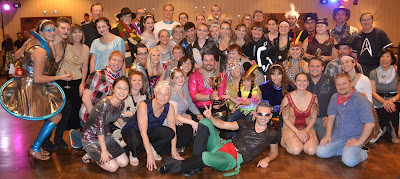Do You Have the Competitor's Edge?
by Stephen Knight
 |
| Stephen Knight, Co-National Dance Director, Fred Astaire Dance Studios |
In October, I was at the Fred Astaire National Dance Championships
in Orlando, Florida, with three very exciting nights of professional
competition to look forward to!
One of the most amazing things I noticed while I was watching all the swirling, smiling competitors is that there are many up-and-coming talented new couples hitting the dance floor. Since the West Coast Dance Championships in sunny San Diego are just around the corner (January 16-18) and CCDC (in Atlanta for the first time) will be here before we know it (April 22-26) this is probably a perfect time to educate our new competitors and,
perhaps, even some of our seasoned ones, on what it really takes to be really good at
competition.
 |
| Really good at competition, like these people (if you so choose)! |
1. It starts with rehearsals – good ones.
“Rehearsal“ means a minimum of practice 2 hours a day at least 6 days a week. “Good” means working with your partner as a member of a team, and not arguing about what he or she or you might have done wrong. Remember, your dance partner does not make mistakes on purpose; that’s the reason why we practice and rehearse! Try treating your partner like you expect to be treated, and you will find you’ll get to your goals a lot faster without the wasteful setbacks that arguing causes. |
| We all put on our dance shoes one foot at a time... |
2. The next most important thing you need is a super support team.
That may consist of your management team at the studio, coaches you have
chosen to work with, the people who design and create your costumes and anyone
else you feel you need to help you get to your desired goal. At times, you may
need a personal trainer to help keep you at the physical level that your sport
requires, so don’t hesitate if this is the case. I had a trainer most of my
career because it kept me physically and mentally stronger, which allowed me to
be more prepared and capable when I competed. It paid off, believe me!
 |
| A support team like the folks at FADS (these wonderful people are from our Madison, WI, studio) can make a huge difference in your dancing career -- and your life's happiness! |
3. Now I'm going to address the never-ending battle of grooming.
This is so important because of the impression it makes on the
judges. Costuming can make or break any couple in a competition. So, if you are
going to invest the time and finances it takes to rehearse, be coached, cover entry
fees, buy airline tickets, and pay for hotels, let's make sure that grooming is
the very last problem we could possibly have! “Properly groomed” simply means
we’re in costumes that enhance our bodies, with makeup and hair done correctly.
There are plenty of professionals in these areas who are at your disposal, and
they will love to help make you look like a champion, so invest just that
little bit more for their services, then watch it pay off in a grand way!
 |
| "You are so pahfect, my dahling!" |
4. The last qualification for being a great professional competitor is good sportsmanship.
Obviously, in any competition there will be
winners and losers. It is so important to lose gracefully! But I have seen far too many times when
couples act unprofessionally due to a particular result and I'm here to tell
you FOR SURE that it does not fare well with the judges. That impression of you
will stay with them for a long time. So, do yourself a favor when you don’t
like what you’ve heard: go up to your room and have your pity party there, out
of sight of anyone who could form a bad image of you!! The players and the
results will change all the time, so just learn from your mistakes and move
on. Remember, this is not just about being a good dancer; you must
also be a good winner and a good loser — to put it in a nutshell, a good person! That alone, my friends, will take you a long way in this
industry and help assure you a long and prosperous career.
 |
| You? A sore loser? No way! You'd better just get over yourself, now, y'hear me? |

